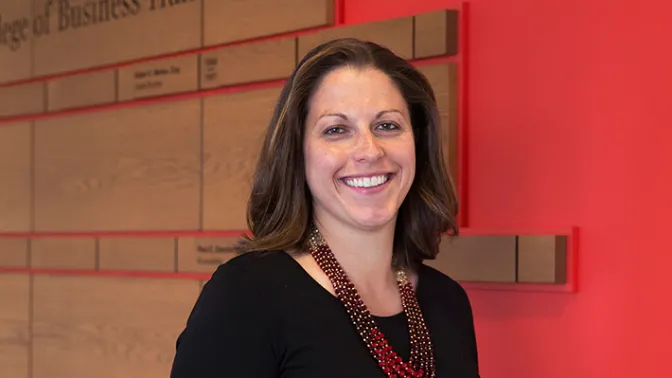
LeBow Researcher Awarded $1.07 Million Grant from the U.S. Army Research Institute
Anyone who has ever worked in a team environment knows that the comings and goings of colleagues can have a ripple effect. A perfect example of this is the 2022 Philadelphia Phillies. Multiple moves and role shifts — both big and small — led to an improbable World Series run. From pre-season acquisitions and trades to a mid-season change in management, the team improved for the better. But given a different team with different players, would this have been the outcome? With help from a U.S. Army Research grant, Lauren D’Innocenzo, PhD, Provost Solutions Fellow and associate professor of organizational behavior, hopes to answer this question.
Organizations are increasingly called upon to solve complex problems in changing conditions that require the combined knowledge, skills, perspectives and efforts of multiple individuals. Through a grant from the U.S. Army Research Institute for the Behavioral and Social Sciences (ARI) Foundational Science Research Unit for $1.07 million over the next three years, with the possibility of two additional option years to extend to five years, and $1.7 million of support, D’Innocenzo and her co-principal investigator, Michael Kukenberger, PhD, associate professor of organizational behavior at the University of New Hampshire, look to explore how changes within and between team members affects the dynamic composition of the team.
D’Innocenzo and Kukenberger, along with Dale Watson, PhD, assistant teaching professor at Pennsylvania State Harrisburg and retired U.S. Army Colonel, and two Drexel LeBow PhD students funded by the grant, will conduct research examining team composition as a dynamic, complex and rotating combination of member attributes and contributions, which are also tied to team behavior and structure. In other words, what happens when people move in and out of teams?
“When composition changes, teams need to be able to adapt and respond to keep things moving forward effectively. However, we’re not just interested in how the team adapts, but how do these changes impact the growth and development of team members? Can I learn something or develop new skills when these changes happen?” said D’Innocenzo.
Through their research, they will look to understand how personalities and attributes change over time as a result of these disruptions. As part of a team, do people develop new skills, do they feel as though they are a better team member, and have they developed better organizational skills?
As a large organization, the Army is a unique group with its own culture of shared languages, beliefs, goals, values, symbols and practices. Team composition has been argued to be highly variable in organizations defined by high levels of dynamism and complexity — precisely the type of environment the U.S. military is embedded in. The Army recognizes the importance of understanding that the effectiveness of team changes when members change.
D’Innocenzo and Kukenberger see their approach to composition development as highly applicable to Army doctrine. Adapting to new team members and a new subsequent environment is a crucial tenant of informal learning in the Army. Understanding the impact of member change can help Army personnel adapt to changes and turn potential disruption situations into positive transition events.
Currently the Army is explicit about how they adapt to team changes. D’Innocenzo and Kukenberger believe that many of the essential qualities and development programs of good teamwork, including identity, cohesion and climate may help to create the conditions for successful change adaption. However, they believe that a different set principle likely applies and depends on the type of membership change and that successful transition may include understanding how to optimize member rotation best.
“Our hope is this research will uncover new and practical considerations for the U.S. Army when it comes to how they handle changes in team composition. Often times, changes occur simply based on who’s available. We think there are great opportunities to be more purposeful and allow for learning and growth and support personnel readiness,” said D’Innocenzo.
About the U.S. Army Research Institute for the Behavioral and Social Sciences (ARI) ARI is the Army’s lead agency for the conduct of research, development and analyses for the improvement of Army readiness and performance via research advances and applications of the behavioral and social sciences that address personnel, organization, and soldier and leader development issues. ARI’s mission is to drive scientific innovation to enable the Army to acquire, develop, employ and retain professional soldiers and enhance personnel readiness. The mission of the Basic Research Program is to develop fundamental theories and investigate new domain areas in behavioral and social sciences with high potential impact on Army issues related to personnel readiness.
Funding Issued by: U.S. Army Contracting Command-Aberdeen Proving Ground Research Triangle Park Division



